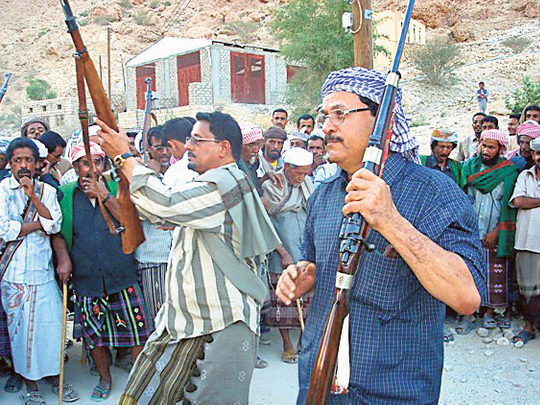
Sana'a: Weapons possession has deeply ingrained in the mindset of most of Yemenis. Many Yemenis think that carrying a gun is like wearing a tie and is an indispensable household item like a TV or refrigerator.
Arms possession is mainly common in the north and northwest of the country where tribal customs wield enormous influence within society. Someone's manhood is often gauged by the kind of weapon he carries.
Abu Faisal, a tribal figure, said that people in some places are driven by their tribe to buy a weapon and those who cannot use weapons are usually stigmatised. "Armed people parade their guns when there is a special occasion like Eid, marriage.. etc."
As his village is peaceful, his weapons are gathering dust. "Look! I have many pieces of guns and I don't use them since there is no need. You just feel secured when you have weapons".
In his village, young people, including children, proudly show off their weapons by shooting bullets in the air during the tribal gatherings. Often men are taken into the mountains for training on weapon use.
Anyone can get their hands on firearms in Yemen if they can afford it. Among the available weapons are AK-47 assault rifles, hunting rifles, pistols, landmines — even hand grenades and rocket launchers are available for sale in small cities in the countryside and available in the black market in big cities. Although there are no reliable statistics on how many firearms are in Yemen, some unofficial figures put the number at 50 million, which means, there are two guns for per citizen.
In a bid to curb the accessibility of weapons, the Yemeni government launched a campaign in 2007 which used draconian measures to tackle the spread of weapons. Thousands of unlicensed arms were confiscated and people were banned from overtly carrying weapons.
However, political turmoil which has gripped the country this year has undermined the state's grip on many parts of the country and weapons are spread out more than ever, exposed the government for simply window dressing the issue instead of actually tackling it. In actuality, the inaction backfired on the government when heavily armed tribes defected from the government and turned its weapons instead against the regime. For example, a government warplane was shot down by armed tribesmen recently, which was carrying out strikes on positions north of Sana'a.
Eyewitnesses in the Shabwa and Jawf provinces told Gulf News that tribesmen have stormed security camps, looting hundreds of medium to high range firearms.
Because of the massive proliferation of weapons in Yemen, crime runs rampant especially because of tribal conflicts — with mini wars erupted quite frequently. Local media in Yemen often report on shocking crimes involving weapons. In one case, a six-year-old boy accidentally shot and killed another child while playing with a gun, and his mother was also critically injured.
According to statistics published by the Yemeni Ministry of Interior, 508 people were killed in 2010 from accidental gunfire. Dr Khalid Yaslem Bel Khasher, an academic at Hadramout University has been a pioneer against the proliferation of weapons in Yemen, but admits that weapons are deeply ingrained in tribal culture.
"Most tribes in the countryside proudly own stocks of weapons. They believe owning weapons protects the tribe's members from attacks by rival tribes. Weapons are a deterrent," he told Gulf News.
When communist south Yemen collapsed during the civil war in 1994, tribes looted the huge arsenal of the fallen state.
The main reason for the failure of the government to curb the proliferation of weapons, is that they focused only on big cities, according to Bel Khasher. "However, Yemen is not only big cities, there are many small cities and villages that were overlooked," he said.
Bel Khasher remembers 16 years ago one could purchase a Kalashnikov for $50. Now the price is about $1,500, which is still affordable to wealthy tribe leaders.
- 508: killed in 2010 from accidental gunfire
- 50m: firearms in Yemen as per unofficial figures
- $1,500: price of a Kalashnikov now
- $50: for a Kalashnikov in Yemen 16 years ago












